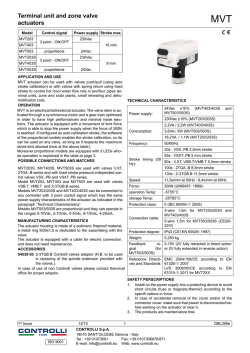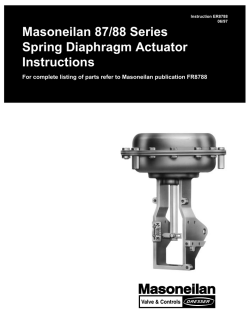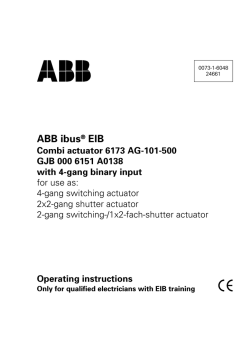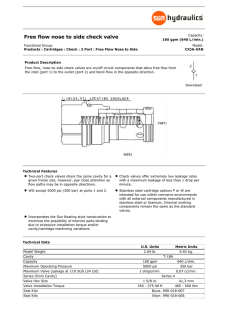
EB 5824-1 EN - Samson AG Mess
Electric Actuators Type 5824 without fail-safe action Type 5825 with fail-safe action Three-step version Mounting and Operating Instructions EB 5824-1 EN Edition January 2015 Definition of signal words DANGER! Hazardous situations which, if not avoided, will result in death or serious injury WARNING! Hazardous situations which, if not avoided, could result in death or serious injury 2 NOTICE Property damage message or malfunction Note: Additional information Tip: Recommended action EB 5824-1 EN Contents 1 General safety instructions..............................................................................5 2 Design and principle of operation...................................................................6 2.1 Additional equipment......................................................................................7 2.2 Technical data · Type 5824..............................................................................8 2.3 Technical data · Type 5825............................................................................10 3 Attachment to the valve................................................................................12 3.1 3.1.1 3.1.2 Type 5824 Actuator......................................................................................12 Force-locking attachment...............................................................................12 Form-fit attachment.......................................................................................12 3.2 3.2.1 3.2.2 Type 5825 Actuator......................................................................................13 Force-locking attachment...............................................................................13 Form-fit attachment.......................................................................................14 3.3 Mounting position.........................................................................................14 3.4 Travel indication scale...................................................................................14 4 Electrical connections....................................................................................15 5 Handwheel..................................................................................................17 6 Additional equipment...................................................................................18 6.1 Limit contacts................................................................................................18 6.2 Resistance transmitter....................................................................................18 7 Dimensions in mm........................................................................................19 8 Nameplate...................................................................................................21 9 Customer inquiries.......................................................................................21 EB 5824-1 EN 3 General safety instructions 1 General safety instructions For your own safety, follow these instructions concerning the mounting, start up and operation of the actuator: −− The actuator is to be mounted, started up or operated only by trained and experienced personnel familiar with the product. According to these mounting and operating instructions, trained personnel refers to individuals who are able to judge the work they are assigned to and recognize possible dangers due to their specialized training, their knowledge and experience as well as their knowledge of the applicable standards. −− Any hazards that could be caused in the valve by the process medium and the operating pressure or by moving parts are to be prevented by taking appropriate precautions. −− The actuator is designed for use in low voltage installations. For wiring and maintenance, you are required to observe the relevant safety regulations. Only use protective equipment in which the power supply cannot be reconnected inadvertently. −− Before wiring the actuator, disconnect it from the power supply. To avoid damage to any equipment, the following also applies: −− Proper shipping and storage are assumed. Note: Devices with a CE marking fulfill the requirements of the Directives 2004/108/EC and 2006/95/EC. The Declaration of Conformity is available on request. EB 5824-1 EN 5 Design and principle of operation 2 Design and principle of operation Type 5824 without fail-safe action This actuator without fail-safe action has a handwheel (2) used to manually position the valve. Travel and direction of action can be read off the travel indication scale (9). The actuator contains a reversible synchronous motor and a maintenance-free gear. The motor is switched off by torque-dependent limit switches or in case of overload. Type 5825 with fail-safe action The actuator contains a spring mechanism (8) and an electromagnet. The actuator moves to the fail-safe position when the electromagnet is de-energized. This causes the coupling between gear and actuator motor to disengage. The actuator stem is completely extended or retracted by the spring mechanism. The force of the motor is transmitted to the actuator stem (3) via gear and crank disk. When the actuator stem extends, it pushes against the valve's plug stem. When the actuator stem retracts, the return spring in the valve causes the plug stem to follow the movement (force-locking connection). Actuator and valve are connected by the coupling nut (4). 7.2 7.1 8 0 9.1 9 1 10 2 2.1 1.1 6 1 2 6 0 15 15 12 3 Retracts Extends 5 6 1.2 1 1.1 1.2 2 2.1 3 4 5 6 7.1 7.2 8 9 9.1 10 Housing Front cover Cable entry Handwheel (Type 5824 only) Actuating shaft Actuator stem Coupling nut Cam disk Limit contact Adjuster for limit contact Adjuster for limit contact Spring assembly (Type 5825 only) Travel indication scale Follower pin Torque-dependent limit switch 4 Do not open the back housing cover. Fig. 1: Type 5824/5825 Actuator (front cover open), with force-locking attachment to the valve 6 EB 5824-1 EN Design and principle of operation The Type 5825 Actuator is available with fail-safe action "actuator stem extends" or "actuator stem retracts". ÎÎ The fail-safe action must not be used to control the valve position. The Type 5825 Actuator does not have a handwheel (2) on the housing cover. Manual override is possible, after removing the front cover, using a 4 mm Allen key. The actuator returns to its original position as soon as the Allen key is released. Version with faster motor The Types 5824-13/-23/-33 and Types 5825-13/-23 have a more powerful motor in a housing at the back of the actuator. 2.1 Additional equipment −− The resistance transmitter is linked to the gear and produces a resistance signal between approx. 0 and 1000 Ω (useable range 0 to 800 Ω ) proportional to the valve travel. The resistance transmitter is not suitable for retrofitting. −− On request, the actuator can be fitted with two limit contacts. They are activated by continuously adjustable cam disks. The power supply as well as the inputs and outputs are not galvanically isolated. The two additional limit contacts are not suitable for retrofitting. Testing according to DIN EN 14597 The Type 5825 Electric Actuator with fail-action "actuator stem extends" is tested by the German Technical Inspectorate (TÜV) according to DIN EN 14597 in combination with various SAMSON valves. The register number is available on request. EB 5824-1 EN 7 Design and principle of operation 2.2 Technical data · Type 5824 Type 5824 -10 -13 -20 -30 -33 6 1) 6 1) 12 12 15 15 Standard: 0.17 mm/s • – Actuator with faster motor: 0.33 mm/s • – • – – • – • – • s 35 1) 18 1) 70 36 90 45 700 700 700 700 700 700 Fail-safe action Without Rated travel mm Stroking speed -23 Transit time for rated travel Thrust Extends N Retracts N – – – – 700 700 Attachment Force-locking • • • • – – Form-fit – – – – • • Handwheel Yes Power supply 24 V, 50 Hz • – • – • – 230 V, 50 Hz/60 Hz 2) • • • • • • • – • – • – 3 6 3 6 3 6 120 V, 60 Hz Power consumption Approx. VA Permissible temperatures Ambient 0 to 50 °C Storage –20 to +70 °C At the actuator stem 0 to 135 °C 4) Safety Degree of protection Class of protection IP 54 3) II (according to EN 61140) Overvoltage category II (according to EN 60664) Degree of contamination 2 (according to EN 60664) Electromagnetic compatibility Vibration 8 According to EN 61000-6-2, EN 61000-6-3 and EN 61326 According to EN 60068-2-6 and EN 60068-2-27 EB 5824-1 EN Design and principle of operation Additional electrical equipment (not suitable for retrofitting) Two limit contacts, max. 230 V, 1 A • • • • • • One resistance transmitter, 0 to 1000 Ω ±15 % (90 % of final value at rated travel); max. 1 mA, 5 V • – • – • • Materials Housing, housing cover Plastic (PPO with glass fiber reinforcement) Coupling nut, M30 x 1.5 Weight 1) 2) 3) 4) Brass kg (approx.) 0.75 1.00 0.75 1.00 0.75 0.75 Actuators with 6 mm travel can also be used for valves with 7.5 mm travel (45 s transit time, 22.5 s for actuator with faster motor). Special version The degree of protection IP 54 can only be achieved up to device index .03 when the actuator is installed in the upright position. See last two figures of the configuration ID (Var.-ID) written on the nameplate, e.g. Var.-ID xxxxxx.xx, for the device index. Maximum 130 °C up to device index .03. See last two figures of the configuration ID (Var.-ID) written on the nameplate, e.g. Var.-ID xxxxxxx.xx, for the device index. EB 5824-1 EN 9 Design and principle of operation 2.3 Technical data · Type 5825 Type 5825 -10 -13 -20 -23 Fail-safe action -30 -33 -15 6 -25 -35 With Operating direction Extends Rated travel mm Stroking speed 12 15 15 – • – • – – • – • – Standard: 0.17 mm/s • Actuator with faster motor: 0.33 mm/s 6 Retracts 12 6 1) 1) 12 15 • • • • – – – 1) Transit time for rated travel s 35 1) 18 1) 70 36 90 45 35 1) 70 90 Transit time for fail-safe action s 4 4 6 6 7 7 4 6 7 Extends N 500 500 500 500 280 280 500 500 280 Retracts N – – – – 280 280 – – 280 N 500 500 500 500 280 280 – 3) – 3) 280 Force-locking • • • • – – • • – Form-fit – – – – • • – – • Thrust Nominal thrust of safety spring Attachment Handwheel Possible 2) Power supply 24 V, 50 Hz • – • – • – • • • 230 V, 50 Hz/60 Hz 4) • • • • • • • • • • – • – • – • • • 4 8 4 8 4 8 4 4 4 120 V, 60 Hz Power consumption Approx. VA Permissible temperatures Ambient 0 to 50 °C Storage –20 to +70 °C At the actuator stem 0 to 135 °C 6) Safety Degree of protection IP 54 5) Class of protection II (according to EN 61140) Overvoltage category II (according to EN 60664) 10 EB 5824-1 EN Design and principle of operation Degree of contamination 2 (according to EN 60664) Electromagnetic compatibility According to EN 61000-6-2, EN 61000-6-3 and EN 61326 Vibration According to EN 60068-2-6 and EN 60068-2-27 Additional electrical equipment (not suitable for retrofitting) Two limit contacts, max. 230 V, 1 A • • • • • • • • • One resistance transmitter, 0 to 1000 Ω ±15 % (90 % of final value at rated travel); max. 1 mA, 5 V • – • – • • • • • 1.00 1.00 Materials Housing, housing cover Plastic (PPO with glass fiber reinforcement) Coupling nut, M30 x 1.5 Weight 1) 2) 3) 4) 5) 6) kg (approx.) Brass 1.00 1.25 1.00 1.25 1.00 1.25 1.00 Actuators with 6 mm travel can also be used for valves with 7.5 mm travel (45 s transit time, 22.5 s for actuator with faster motor). Manual override using 4 mm Allen key (after removing the cover); actuator always returns to fail-safe position after release Safety spring pulls actuator stem to retracted end position; valve operated by valve spring. Special version The degree of protection IP 54 can only be achieved up to device index .03 when the actuator is installed in the upright position. See last two figures of the configuration ID (Var.-ID) written on the nameplate, e.g. Var.-ID xxxxxx.xx, for the device index. Maximum 130 °C up to device index .03. See last two figures of the configuration ID (Var.-ID) written on the nameplate, e.g. Var.-ID xxxxxxx.xx, for the device index. EB 5824-1 EN 11 Attachment to the valve 3 Attachment to the valve 3.1.2 Form-fit attachment The actuator is mounted either directly onto the valve or using a yoke depending on the valve version used (Fig. 2). 1. Place the actuator on the yoke and tighten coupling nut (4) (tightening torque 20 Nm). 3.1 Type 5824 Actuator 2. Place actuator with yoke (15) on the valve and tighten the nut (17) (min. tightening torque 150 Nm). 3.1.1 Force-locking attachment 3. Pull plug stem until it reaches the actuator stem or extend actuator stem using the handwheel (2). 1. Turn the handwheel (2) counterclockwise to retract the actuator stem. 2. Place the actuator on the valve connection and tighten coupling nut (4) (tightening torque 20 Nm). 2 3 4 15 16 17 0 4. Position the clamps of the stem connector (16) included in the accessories on the ends of the actuator stem and plug stem and screw tight. Handwheel Actuator stem Coupling nut Yoke Stem connector Nut 0 2 4 15 3 4 16 17 Force-locking attachment with coupling nut, e.g. to Type 3222 Valve Form-fit attachment with stem connector, e.g. with yoke on Series V2001 Valve Fig. 2: Attaching actuator and valve 12 EB 5824-1 EN Attachment to the valve 3.2 Type 5825 Actuator Actuating shaft 3.2.1 Force-locking attachment Fail-safe action "actuator stem extends" The actuator stem must be retracted before the actuator can be mounted onto the valve. The stem can be retracted either mechanically or electrically. Both methods are described below. Retracting the actuator stem mechanically 1. Unscrew front cover and place a 4 mm Allen key on the red actuating shaft. 2. Retract the actuator stem: Turn Allen key counterclockwise only and only as far as the final travel value which is at the point where the torque-dependent limit switch is activated (switching off the motor, Fig. 3). NOTICE Risk of damage to the actuator by turning it too far. Only retract the actuator stem as far as the final travel value. 3. Hold Allen key in place and fasten valve and actuator together using the coupling nut (tightening torque 20 Nm). Remove Allen key and carefully refasten the front cover. Tag at final travel value (torque-dependent limit switch activated) Tag Fig. 3: Tag Retracting the actuator stem electrically 1. Unscrew front cover. 2. Perform electrical wiring according to Fig. 6 on page 16 and carefully refasten the front cover. 3. Retract actuator stem: Switch on power supply and retract the actuator stem electrically until it reaches the end position (voltage applied to eL and N or using controller). NOTICE Risk of damage to the actuator due to incorrect connection of the voltage. Do not apply a voltage to eL and aL at the same time. 4. Fasten valve and actuator together using the coupling nut (tightening torque 20 Nm). EB 5824-1 EN 13 Attachment to the valve Fail-safe action "actuator stem retracts" ÎÎ Place the actuator on the valve connection and tighten coupling nut (tightening torque 20 Nm). 3.2.2 Form-fit attachment ÎÎ For fail-safe action “actuator stem retracts” and “actuator stem extends”, mount actuator as described in section 3.1.2. 3.3 Mounting position The travel indication scale has two opposed scales. Which scale is to be used depends on the valve version (Fig. 5). Globe and three-way diverting valves: The driving pin is in position 0 (delivered state). Three-way mixing valve: ÎÎ Remove scale, turn it and replace it so that the pin is positioned over the appropriate hole (6, 12 or 15) corresponding to the rated travel (6, 12 or 15 mm travel). 6 0 Hole for driving pin with threeway mixing valve 0 126 15 151 2 The control valve can be installed in the pipeline in any desired position. However, a suspended mounting position of the actuator is not permissible (see Fig. 4). 3.4 Travel indication scale 0 6 121 5 Driving pin in position 0, location of scale with globe or three-way diverting valves (delivered state) Fig. 4: Mounting position 1) 1) Fig. 5: Travel indication scale The degree of protection IP 54 can only be achieved up to device index .03 when the actuator is installed in the upright position. See the last two figures of the configuration ID (Var.-ID) written on the nameplate (see page 21) for the device index. 14 EB 5824-1 EN Electrical connections 4 Electrical connections DANGER! −−Upon installation of the electric cables, you are required to observe the regulations concerning low-voltage installations according to DIN VDE 0100 as well as the regulations of your local power supplier. −−Use a suitable power supply which guarantees that no dangerous voltages reach the device in normal operation or in the event of a fault in the system or any other system parts. −−Connect the actuator to the electrical network only after the power supply is first switched off. Make sure the power cannot be switched on unintentionally! −−Type 5825: To operate the actuator, the power supply must be connected to the terminals L and N. ÎÎ Route wiring through the cable entries (1.2 in Fig. 1) and connect as shown in Fig. 6. The control signals of the controller are connected to the terminals eL and aL: NOTICE Risk of damage to the actuator due to incorrect connection of the voltage. Do not apply a voltage to eL and aL at the same time. −− If voltage is applied to eL, the actuator motor retracts the actuator stem. −− If voltage is applied to aL, the actuator motor extends the actuator stem. NOTICE −−The interference suppression capacitors Ce in the output circuit of the connected controller must not exceed a value of 2.5 nF to ensure the proper functioning of the actuator. A special actuator version is available on request for connection to controllers with larger interference suppression capacitors. −−Actuators operated in parallel must be connected over separate contacts to prevent the actuators hunting in the end positions due to a shared OPEN or CLOSED contact. EB 5824-1 EN 15 Electrical connections Ce Controller Ce Ce Three-step signal N + – N L N eL aL N L Ce N + – N L N eL aL N L eL Actuator stem retracts aL Actuator stem extends eL aL Type 5825 only Additional electrical equipment Limit contacts 41 44 42 51 Resistance transmitter 54 52 63 62 61 Fig. 6: Electrical connection 16 EB 5824-1 EN Handwheel 5 Handwheel Type 5825 Actuator Travel and direction of action can be read offthescaleofthetravelindicator(Fig.7). Travel indication scale DANGER! Risk of electric shock due to touching live parts. Do not touch live parts on operating the manual override. 1. Unscrewfrontcoverandplacea4 mm Allen key on the red actuating shaft. Handwheel (Type 5824only) NOTICE Risk of damage to the actuator by turning it too far. Only retract the actuator stem as far as the final travel value. 2. Turn the Allen key: Fig. 7: Type 5824 Electric Actuator Type 5824 Actuator Î Turn it counterclockwise only for a version with "actuator stem extends" failsafe action. Use the handwheel to adjust the travel (approx.4turnsfor1mm): Î Turn it clockwise only for a version with "actuator stem retracts" fail-safe action. − Turn clockwise: The actuator stem extends. 3. TurntheAllenkeyonlyasfarasthefinal travel value, which is at the point where the torque-dependent limit switch is activated(switchingoffthemotor). Once the magnet has been released, the spring mechanism pushes the actuator stem back to the fail-safe position. − Turn counterclockwise: The actuator stem retracts. 4. Remove Allen key and carefully refasten the front cover. EB 5824-1 EN 17 Additional equipment 6 Additional equipment 6.1 Limit contacts DANGER! Risk of electric shock due to touching live parts. Do not touch live parts on adjusting the limit contacts. The limit contacts (6, Fig. 1) can optionally be used as double-throw, make or break contacts. Terminal assignment (Fig. 6): −− Terminals 41, 44, 42: à Bottom cam disk, adjuster 7.1 −− Terminals 51, 54, 52: à Top cam disk, adjuster 7.2 1. Unscrew front cover. 2. Move the actuator to the travel position at which switching point is to be activated. 3. Use a 4 mm Allen key to turn the adjusters (7.1 or 7.2 in Fig. 1) up to the point where the contact is triggered. The angle of rotation of the cam disks is limited. Therefore, use preferably the top adjuster (7.1) for the upper travel range and the bottom adjuster (7.2) for the lower travel range. 18 6.2 Resistance transmitter As the valve passes through its travel range, the resistance value changes from 0 Ω to max. 80 % of its nominal value. Turn a screwdriver placed on the slotted shaft to calibrate the resistance transmitter. Calibrating the actuator with an extended actuator stem at 0 Ω 1. Connect ohmmeter to terminals 61 and 62. 2. Extend the actuator stem to its end position. 3. Turn the resistance transmitter counterclockwise as far as it will go. The ohmmeter indicates the initial value of approx. 0 Ω. Calibrating the actuator with an retracted actuator stem at 0 Ω 1. Connect ohmmeter to terminals 61 and 63. 2. Retract the actuator stem to its end position. 3. Turn the resistance transmitter clockwise as far as it will go. The ohmmeter indicates the initial value of approx. 0 Ω. 4. Only for actuators with 6 or 12 mm travel: Slowly turn the resistance transmitter counterclockwise up to the point where the resistance changes from 0 Ω. EB 5824-1 EN Dimensions in mm 7 Dimensions in mm Type 5824-10 and Types 5825-10/-15/-25 113 82 146 48 44 103 Types 5824-13/-23/-33 and Types 5825-13/-23 (version with faster motor) 48 Faster motor EB 5824-1 EN 51 12 Ø70 18 113 82 146 44 (33) 103 136 19 Additional equipment Type 5824-30 and Types 5825-30/-33/-35 Actuator without yoke Actuator with yoke (1400-7414) 203 6 15 mm travel 46.5 15 mm travel 50 Ø10 136 20 EB 5824-1 EN Nameplate 8 Nameplate 9 Customer inquiries SAMSON 2 1 0062 Electric Actuator Model 4 Var-ID. Serial no. 7 F: 8 s: 3 v: U: 5 9 10 11 14 15 P: Type designation 2 Year of manufacture 3 Configuration ID (Var.-ID) 4 Model designation (Type 5825 only) 5 Serial no. 6 DIN registration number (Type 5825 only) 7 Thrust 8 Rated travel 9 Stroking speed 10 Power supply 11 Power line frequency 12 Power consumption 13 Fail-safe action (Type 5825 only) 14 Resistance transmitter 15 Limit contact EB 5824-1 EN 6 −− Serial no. 12 Made in Germany 1 Extends −− Type designation −− Configuration ID (Var.-ID) 13 f: Please submit the following details: Retracts 21 Weismüllerstraße 3 · 60314 Frankfurt am Main, Germany Phone: +49 69 4009-0 · Fax: +49 69 4009-1507 [email protected] · www.samson.de EB 5824-1 EN 2015-01-30 · English SAMSON AG · MESS- UND REGELTECHNIK
© Copyright 2026




